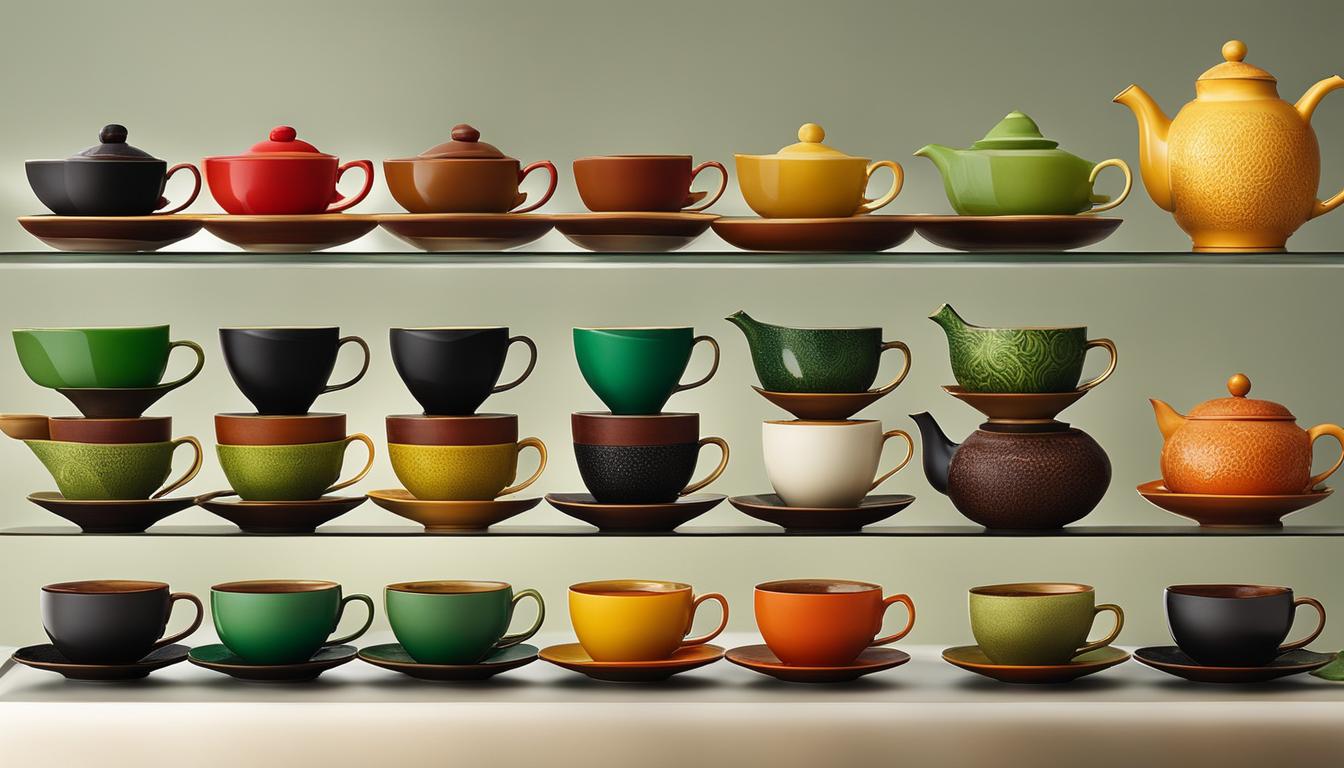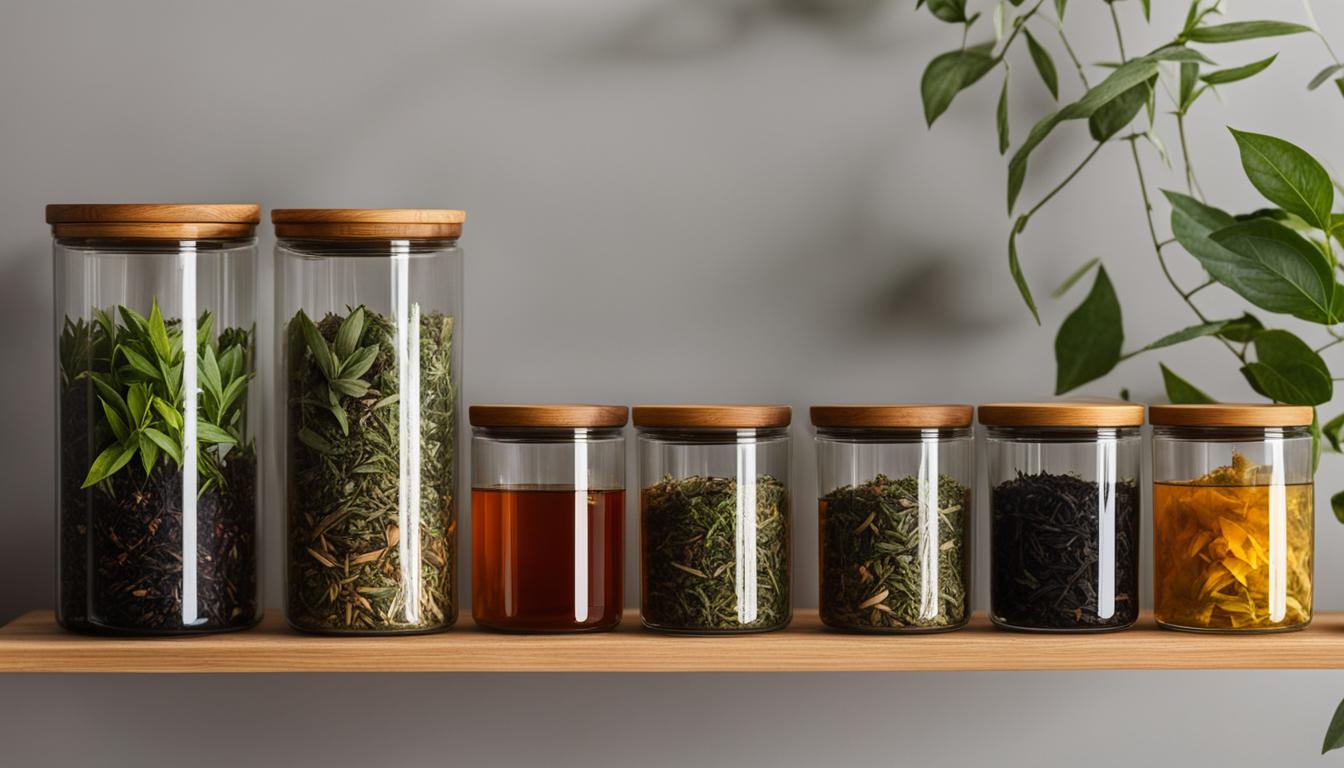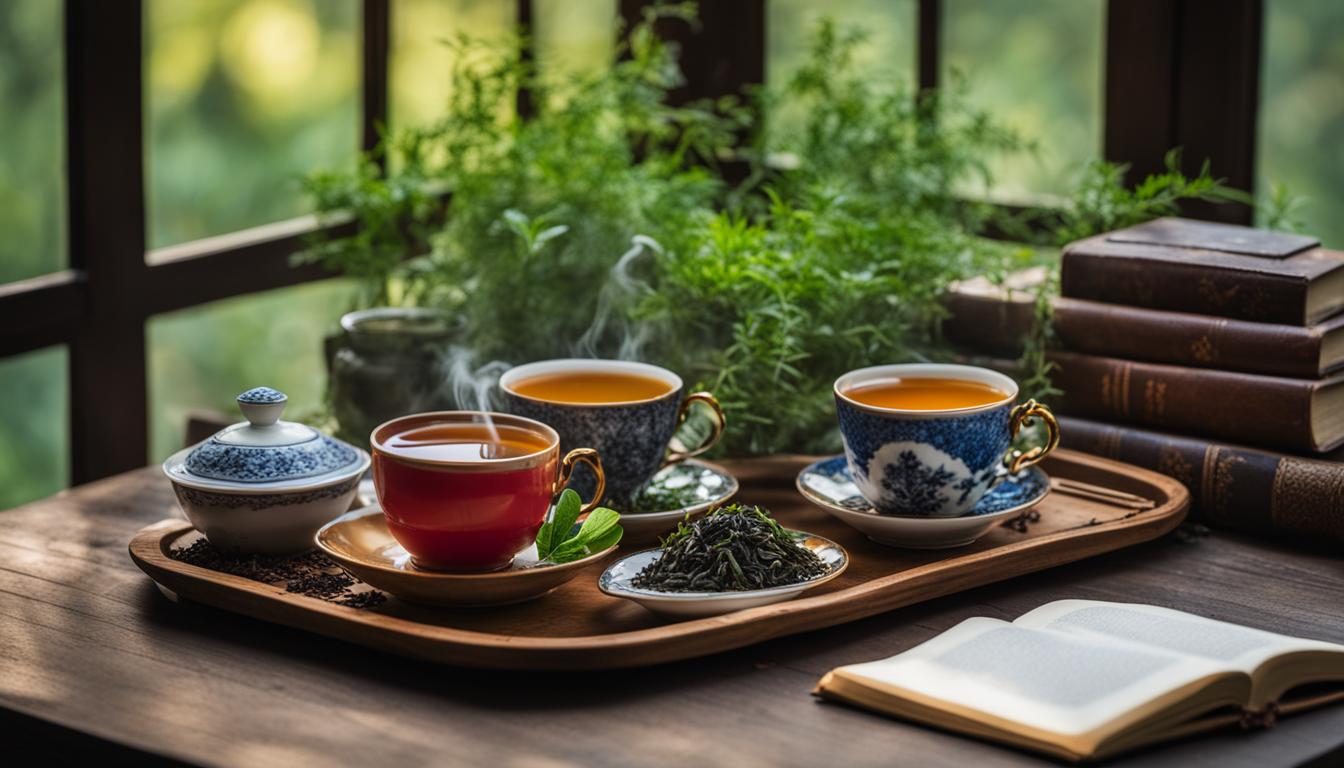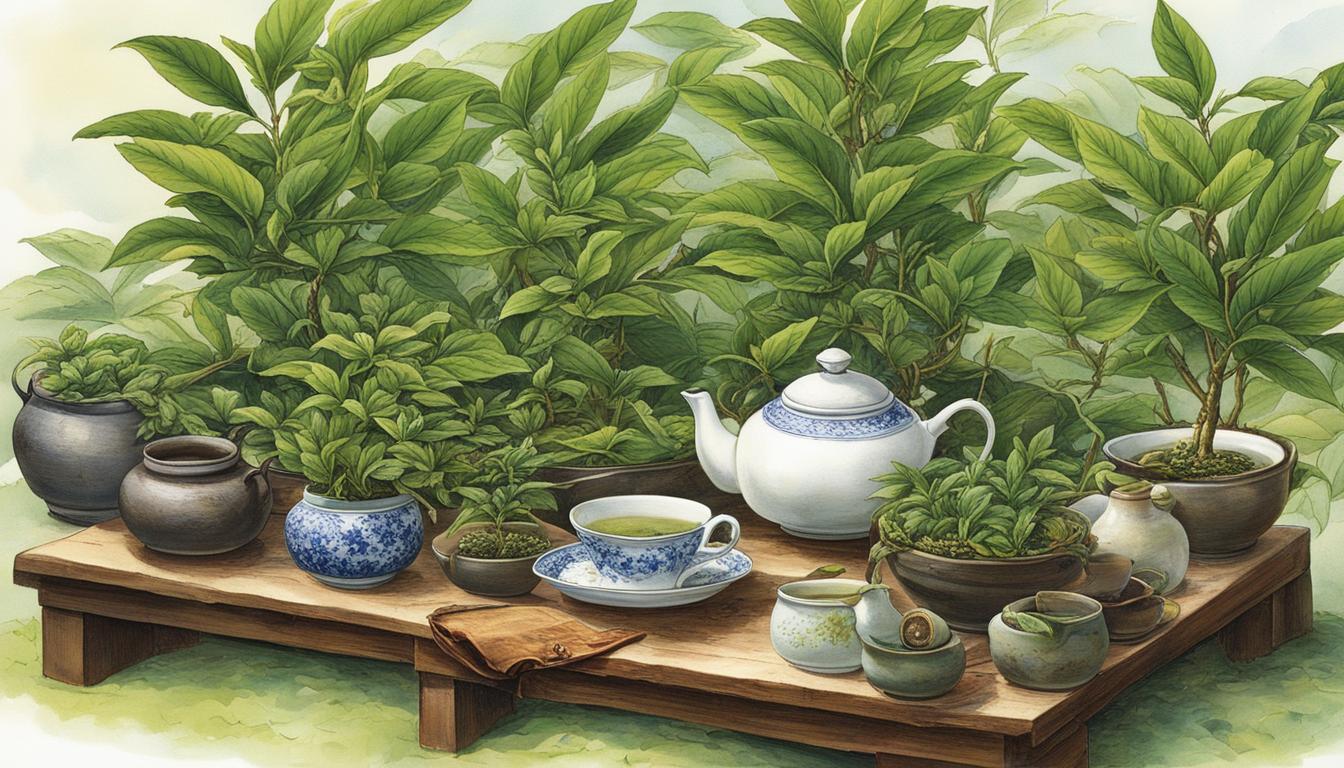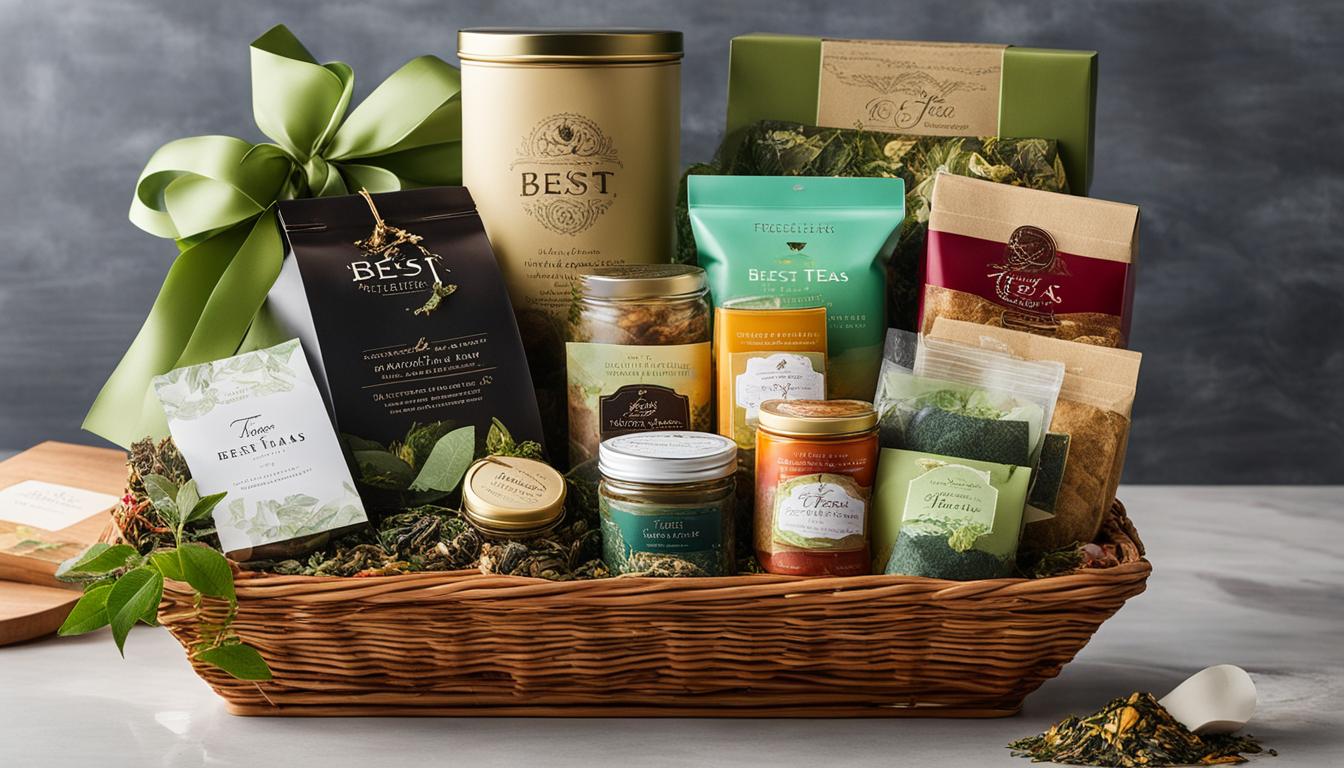Welcome to our insightful exploration of the caffeine levels in different teas. If you’re a tea enthusiast or simply curious about the caffeine content in your favorite brews, you’ve come to the right place. Tea has been enjoyed for centuries, and its caffeine content has always been a hot topic. Let’s dive in and discover the fascinating world of tea and caffeine!
Key Takeaways:
- Tea generally has less caffeine than coffee, especially green and white teas.
- The amino acid L-theanine in tea provides a relaxing effect that balances out the jitteriness of caffeine.
- The antioxidants in tea slow down caffeine absorption, resulting in a gentler and longer-lasting increase in alertness.
- Caffeine content varies between different types of tea, with black tea having the highest amount.
- Decaffeinated tea is not completely caffeine-free, containing about 5-10mg of caffeine per cup.
Caffeine Levels in Different Types of Tea
When it comes to caffeine content, not all teas are created equal. Different types of tea have varying levels of caffeine, allowing tea drinkers to choose a beverage that suits their desired level of alertness. Let’s explore the caffeine levels in some popular tea varieties.
Black Tea
Black tea generally has the highest caffeine content among true teas. A typical 8 fl oz serving of black tea contains approximately 64-112mg of caffeine. This makes black tea a great option for those seeking a more energizing beverage.
Green Tea
Green tea, on the other hand, contains a moderate amount of caffeine. An 8 fl oz serving of green tea typically contains about 24-39mg of caffeine. This makes green tea a popular choice for individuals looking for a balanced and refreshing boost of energy.
Oolong Tea
Oolong tea falls in between black and green tea in terms of caffeine content. It contains approximately 29-53mg of caffeine per 8 fl oz serving. Oolong tea provides a milder stimulation compared to black and green teas, making it a suitable choice for those who prefer a gentler caffeine kick.
White Tea
White tea has the lowest caffeine content among true teas. With about 32-37mg of caffeine per 8 fl oz serving, white tea offers a subtle and delicate infusion without excessive stimulation. It is a great option for individuals who prefer a mellow and calming tea experience.
It’s important to note that herbal teas, such as chamomile and peppermint, are naturally caffeine-free, making them an excellent choice for those who want to avoid caffeine altogether.
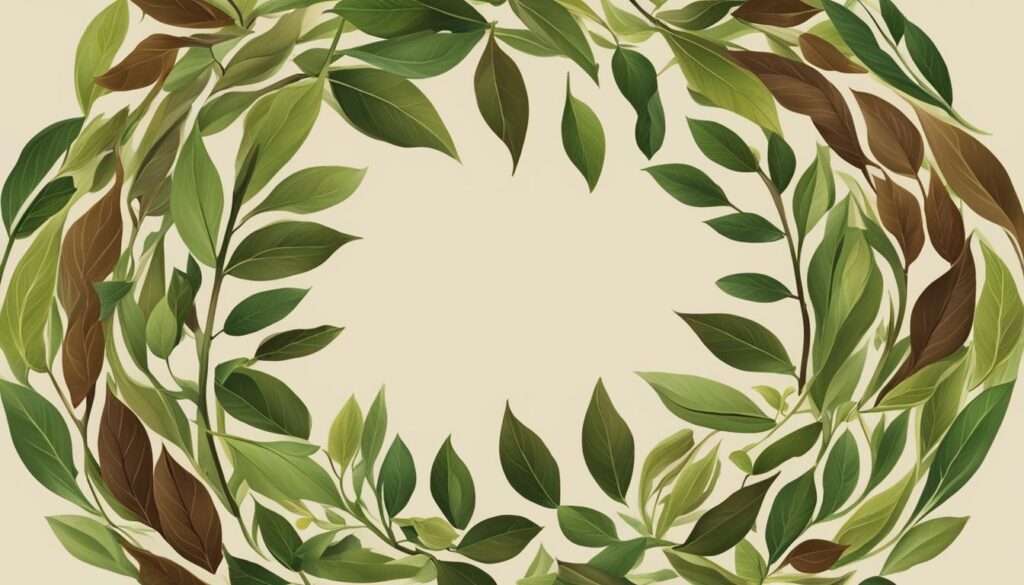
In summary, the caffeine levels in different types of tea can vary significantly. Black tea generally has the highest caffeine content, followed by oolong, green, and white teas. Herbal teas are naturally caffeine-free. Choose your tea based on the caffeine level that best suits your preferences and caffeine tolerance.
Caffeine Content in Popular Tea Varieties
When it comes to tea, caffeine levels can vary depending on the variety. Some teas pack a punch with high caffeine content, while others offer a more subdued experience with low caffeine levels. Let’s take a closer look at the caffeine content in some popular tea varieties.
High Caffeine Teas
If you’re looking for a tea that will give you an energetic boost, there are several options to consider. Silver Needle, Gyokuro, Matcha, Assam, Ceylon, and Darjeeling are known for their relatively high caffeine levels. These teas can provide a stimulating effect and help you feel more alert.
Low Caffeine Teas
If you’re sensitive to caffeine or simply prefer a more mellow tea experience, there are plenty of options to choose from. Genmaicha, Gunpowder, Hojicha, Kukicha, and Keemun are known for their relatively low caffeine levels. These teas offer a smoother and gentler experience without the jitters.
It’s important to note that the caffeine content in tea can vary depending on factors such as brewing method, steeping time, and leaf location on the tea plant. Additionally, teas that come in tea bags or finer loose tea tend to have higher caffeine content compared to loose tea. However, it’s worth mentioning that tea still contains less caffeine than coffee, making it a popular choice for those who want a milder pick-me-up.
| Tea Variety | Caffeine Content (per serving) |
|---|---|
| Silver Needle | 70-75mg |
| Gyokuro | 20-30mg |
| Matcha | 35-70mg |
| Assam | 50-90mg |
| Ceylon | 40-60mg |
| Darjeeling | 30-50mg |
| Genmaicha | 10-20mg |
| Gunpowder | 15-25mg |
| Hojicha | 5-10mg |
| Kukicha | 5-15mg |
| Keemun | 20-30mg |
Now that you have a better understanding of the caffeine content in popular tea varieties, you can choose the tea that suits your preferences and caffeine tolerance. Whether you’re seeking a high-energy boost or a more relaxing experience, there’s a tea out there for everyone.
Caffeine in Decaffeinated Tea
Many people believe that decaffeinated tea is completely caffeine-free, but that is simply not true. Decaf tea still contains a small amount of caffeine, usually ranging from 5-10mg per cup. This may seem insignificant compared to the caffeine content in regular tea, but it is important to be aware of if you are sensitive to caffeine or trying to avoid it altogether.
The myth that decaf tea can be made by steeping the tea briefly and discarding the liquid is just that, a myth. Caffeine is extracted from the tea leaves over time, so steeping for a shorter period does not remove all the caffeine. In fact, it also removes some of the health benefits of tea. To truly decaffeinate tea while preserving its flavor and quality, a specific extraction process is required.
“Decaffeination processes, such as the natural CO2 high-pressure extraction used by The Republic of Tea, can remove most of the caffeine while preserving the flavor and quality of the tea.”
One commonly used method to decaffeinate tea is the natural CO2 high-pressure extraction process. This method involves using carbon dioxide in its supercritical state to extract the caffeine from the tea leaves. The process is gentle and does not affect the flavor or quality of the tea. However, trace amounts of caffeine may still remain in decaf teas even after this extraction process.
The Caffeine Content in Decaffeinated Teas
To give you a better understanding of the caffeine content in decaffeinated teas, here is a table outlining the approximate caffeine levels in popular decaf tea varieties:
| Tea Variety | Approximate Caffeine Content |
|---|---|
| Decaf Black Tea | 5-10mg per cup |
| Decaf Green Tea | 5-10mg per cup |
| Decaf Herbal Tea | Naturally Caffeine-Free |
As you can see, decaf black and green teas still contain a small amount of caffeine, while herbal teas are naturally caffeine-free. If you are looking to eliminate caffeine from your tea completely, opting for herbal teas is the best choice. However, if you still want the taste and aroma of black or green tea without the stimulating effects of caffeine, decaf options are a great alternative.
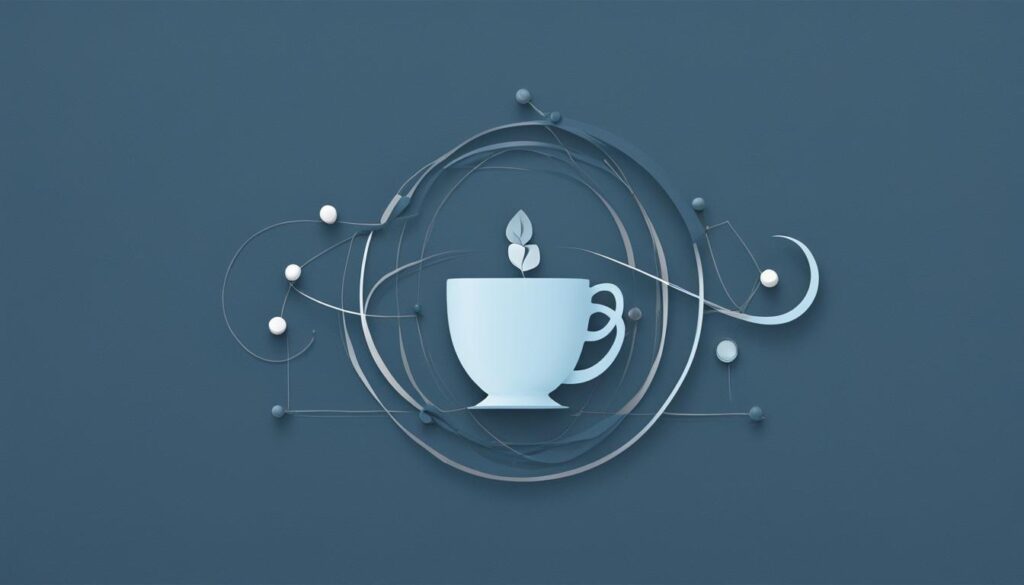
Health Benefits and Risks of Tea and Caffeine
Tea offers a multitude of health benefits due to its rich antioxidant content. Antioxidants help protect our cells from damage caused by harmful free radicals. In particular, tea contains flavonoids, a type of antioxidant that is known for its potential to reduce the risk of heart attack and promote cardiovascular health. The phytochemicals present in tea have also been linked to improved mental alertness and focus. So, by enjoying a cup of tea, you can not only satisfy your taste buds but also give your body a dose of these beneficial compounds.
Moderate tea consumption has also been associated with potential protection against certain types of cancer, such as ovarian cancer. However, it’s important to note that more research is needed to fully understand the extent of tea’s cancer-fighting properties. As with any food or beverage, it’s crucial to consume tea in moderation and balance it with a healthy diet and lifestyle.
“Tea can contribute to a reduced risk of heart attack, improved mental alertness, and potential protection against ovarian cancer.”
While tea can provide health benefits, it’s essential to be mindful of the potential risks of consuming too much caffeine. Excessive caffeine intake can lead to various side effects, including insomnia, headaches, anxiety, increased heart rate, and dependency. For individuals who are pregnant or breastfeeding, have certain health conditions, or are taking specific medications, it is recommended to limit caffeine intake. It’s important to be aware of your personal caffeine sensitivity and prioritize your comfort and well-being.
Benefits of Tea
| Type of Tea | Health Benefits |
|---|---|
| Black Tea | Rich in flavonoids, potential cardiovascular benefits |
| Green Tea | Contains antioxidants, potential mental alertness benefits |
| White Tea | High in antioxidants, potential cancer-fighting properties |
| Herbal Tea | Naturally caffeine-free, various herbal benefits |
Remember to enjoy tea in moderation and be aware of its caffeine content. By understanding the potential health benefits and risks associated with tea and caffeine, you can make informed choices that align with your individual preferences and well-being. So, brew a cup of your favorite tea, savor its flavors, and reap the potential rewards it has to offer.
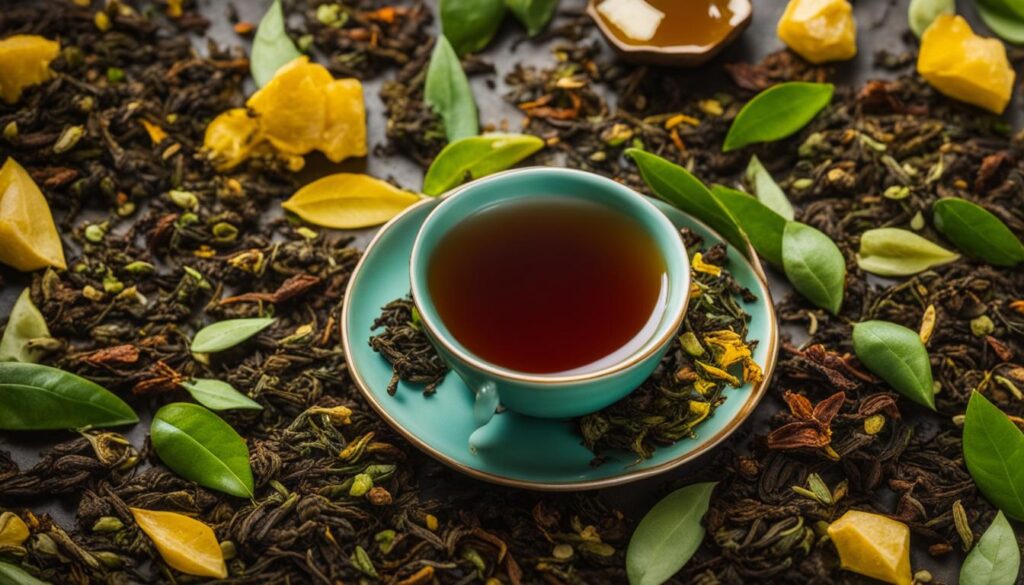
The content of this article should not be construed as medical advice. Please consult a healthcare professional for personalized recommendations.
Conclusion
Understanding the caffeine levels in different teas can help us make informed choices based on our preferences and caffeine tolerance. When it comes to caffeine content, black tea takes the crown, followed by oolong, green, and white teas. If you’re looking for a naturally low-caffeine option, herbal teas and decaffeinated teas are the way to go. However, it’s important to remember that decaf teas still contain trace amounts of caffeine.
As we’ve explored, tea offers a range of health benefits, thanks to its antioxidants, phytochemicals, and other beneficial compounds. But it’s crucial to consume caffeine in moderation. Too much caffeine can lead to unwanted side effects like insomnia, headaches, and anxiety. Certain individuals, such as pregnant or breastfeeding people and those with specific health conditions, should limit their caffeine intake.
Ultimately, the choice of tea and caffeine consumption is a personal one. Take into account your individual factors, caffeine sensitivity, and desired health benefits when enjoying a cup of tea. So go ahead, savor your favorite brew, and find the perfect balance between caffeine and relaxation that suits you best.
FAQ
How does the caffeine content in tea compare to coffee?
Tea generally contains less caffeine than coffee. The average cup of black tea has 40mg of caffeine compared to 105mg in a cup of drip coffee.
What factors affect the caffeine content in tea?
The amount of caffeine in tea can vary based on factors such as brewing method, steeping time, and leaf location on the tea plant.
Which types of tea have the highest caffeine content?
Black tea generally has the highest amount of caffeine, ranging from 64-112mg per 8 fl oz serving.
Are there any teas that are naturally caffeine-free?
Yes, herbal teas such as chamomile and peppermint are naturally caffeine-free.
Is decaffeinated tea completely caffeine-free?
No, decaffeinated tea still contains about 5-10mg of caffeine per cup.
Can decaf tea be made by briefly steeping the tea and throwing away the liquid?
No, caffeine is extracted over time, so steeping for a short period removes both caffeine and the health benefits of tea.
What are the potential health benefits of tea and caffeine?
Tea contains antioxidants, phytochemicals, and other beneficial compounds that can contribute to improved mental alertness, reduced risk of heart attack, increased blood pressure in those with low blood pressure, and potential protection against ovarian cancer.
What are the risks of consuming too much caffeine?
Consuming too much caffeine can lead to insomnia, headaches, anxiety, increased heart rate, and dependency.
Who should limit their caffeine intake?
Pregnant or breastfeeding individuals, those with certain health conditions, and those taking specific medications should limit their caffeine intake.
How can understanding caffeine levels in different teas help individuals make informed choices?
Understanding the caffeine levels in different teas can help individuals make choices based on their preferences and caffeine tolerance.

